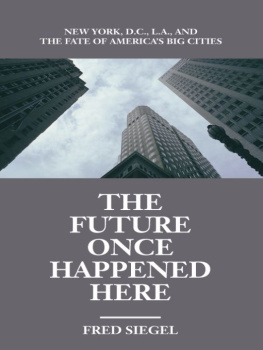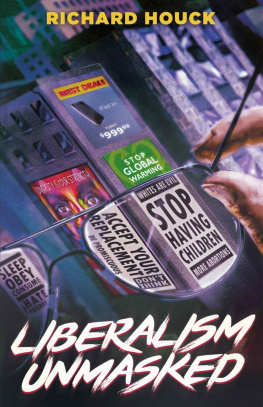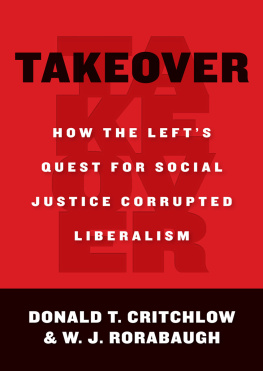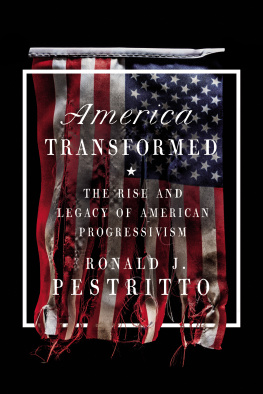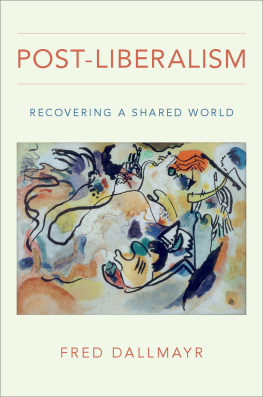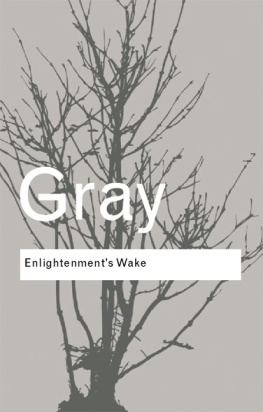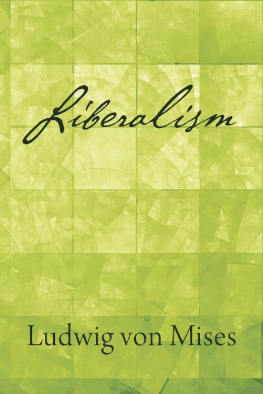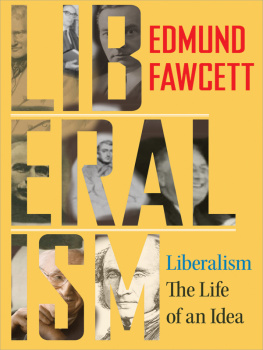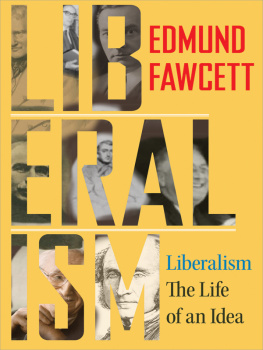The Revolt Against the Masses
How Liberalism Has Undermined
the Middle Class
The Revolt Against the Masses
How Liberalism Has Undermined
the Middle Class
Fred Siegel

Encounter Books
New York London

2013 by Fred Siegel
All rights reserved. No part of this publication may be reproduced, stored in a retrieval system, or transmitted, in any form or by any means, electronic, mechanical, photocopying, recording, or otherwise, without the prior written permission of Encounter Books, 900 Broadway, Suite 601, New York, New York, 10003.
First American edition published in 2013 by Encounter Books, an activity of Encounter for Culture and Education, Inc., a nonprofit, tax-exempt corporation.
Encounter Books website address: www.encounterbooks.com
The paper used in this publication meets the minimum requirements of ANSI/NISO Z39.48-1992 (R 1997) (Permanence of Paper).
FIRST AMERICAN EDITION
LIBRARY OF CONGRESS CATALOGING-IN-PUBLICATION DATA
Siegel, Frederick F., 1945
The revolt against the masses : how liberalism has undermined the middle class / by Fred Siegel.
pages cm
Includes bibliographical references and index.
ISBN 978-1-59403-699-6 (ebook) 1. Middle classUnited StatesHistory20th century. 2. LiberalismUnited StatesHistory20th century. 3. United StatesPolitics and government20th century. I. Title.
HT684.S54 2013
320.51'30973dc23
2013007444
Dedicated to the memory of Frank Macchiarola 19412012
Catholic Democrat, mensch, great Brooklynite
Contents

T his short book is not a comprehensive history of American liberalism. A number of important figures and episodes are merely glossed over. Instead, it rewrites the history of modern American liberalism. It shows that what we think of liberalism todaythe top-and-bottom coalition we associate with President Obamabegan not with Progressivism or the New Deal but rather in the wake of the postWorld War I disillusionment with American society. In the Twenties, the first writers and thinkers to call themselves liberals adopted the hostility to bourgeois life that had long characterized European intellectuals of both the left and the right. The aim of liberalisms founding writers and thinkerssuch as Herbert Croly, Randolph Bourne, H.G. Wells, Sinclair Lewis, and H.L. Menckenwas to create an American aristocracy of sorts, to provide the same sense of hierarchy and order long associated with European statism.
Like communism, Fabianism, and fascism, modern liberalism was a vanguard movement born of a new class of politically self-conscious intellectuals. Critical of mass democracy and middle-class capitalism, liberals despised the individual businessmans pursuit of profit as well as the conventional individuals self-interested pursuit of success, both of which were made possible by the lineaments of the limited nineteenth-century state.
Snobbery is not new to liberalism. But the actual history of liberalism will be new to most readers, which is my reason for writing this book. The history of liberalism as written by liberal historians begins either with the pre-WWI Progressive movement or, more likely, with the New Deal of the 1930s. In the plumb-line account usually wholesaled, there is a direct ascent from the Progressives to the social salvation represented by the New Deal to the Great Society and on up to the present. The Progressives, its said, were the first to show that big non-constitutional government could be used to solve big problems. After the yahoos of the 1920s put the country to sleep for a decade, leading to the stock-market crash, the New Deal rode to the rescue to establish the beau ideal for future governance. Conservatives tell a similar story, but theirs is an account of descent, from liberty into statism.
But the story isnt quite true at beginning, middle, or end. The story of liberalism is more than an account of how the administrative state broke free of its constitutional bonds. Liberalism, like its rivals, including communism, fascism, and social democracy, emerged as part of the early twentieth centurys intellectual response to the newly emergent realities of mass production, mass politics, and mass culture. Like fascism and communism, liberalism was strongly influenced by the Nietzschean ideal of a true aristocracy that might serve as a corrective to the perceived debasements of modern commercial society shorn of traditional hierarchies. It was liberals claim to be an aristocracy based on talent and sensibility that helped define the 1960s and 70s. It was then that highly educated liberalsacting, they said, on behalf of African Americanspushed aside the social-democratic trade unionists within the Democratic Party.
Liberalism was far more intellectually permeable, and far more politically adaptable, than most of its competitors and more willing than all but the trade-union-tied social democrats to work through the existing government structures. These qualities brought it to the forefront of American life. But it nonetheless represents a distinct ethos, a stylized set of political postures often at odds with Americas democratic, capitalist, and egalitarian traditions.
The set of cultural and emotional attachments, the political libido of liberalism, so to speak, coalesced in the wake of WWI in an angry repudiation of Progressivism and Woodrow Wilson. Modern liberalism preceded the New Deal by more than a decade. The very term liberal, in its modern usage, was coined by writers and intellectuals who defined themselves by their hostility to the middle class and the moralistic Progressives who had imposed Prohibition in 1919. As The Revolt Against the Masses will show, liberalism began as a fervent reaction to wartime Wilsonian Progressivism, and it took its still current cultural shape in the 1920s well before the Great Depression came crashing down on the country. It was in the seminal 1920s that the strong strain of snobbery, so pervasive among todays gentry liberals, first defined the then nascent ideology of liberalism.
The best short credo of liberalism came from the pen of the once canonical left-wing literary historian Vernon Parrington in the late 1920s. Rid society of the dictatorship of the middle class, Parrington insisted, referring to both democracy and capitalism, and the artist and the scientist will erect in America a civilization that may become, what civilization was in earlier days, a thing to be respected. Alienated from middle-class American life, liberalism drew on an idealized image of organic pre-modern folkways and rhapsodized about a future harmony that would reestablish the proper hierarchy of virtue in a post-bourgeois, post-democratic world. In the mid-1950s during a brief reconciliation between liberals and their country, the literary critic Lionel Trilling noted that for the first time in the history of the modern American intellectual, America is not to be conceived of as a priori the vulgarest and stupidest nation of the world. This novelty soon passed.
The ideals of the 1920s liberals were, by way of the statist and technocratic elements of the 1930s, carried forward into the 1960s. It was in the 1960s that liberals, even more than conservatives, laid siege to the social-solidarity heritage of the New Deal. In the name of good causes such as opposition to racism and the war in Vietnam, postNew Deal upper-middle-class liberals looked to remake America in their own image by enhancing their own power. They defined middle-class Americans, including those who made it into modest prosperity through unionized work, as the unenlightened objects of their enmity. Much of the middle and lower-middle class, subject to liberal experiments in schooling, crime, and gender relations, reciprocated the animosity. Liberal social programs to combat poverty and reform the schools, their failures now long institutionalized, have produced a government whose grasp far exceeds its competence and whose costs are carried by the private-sector middle class. Like corrupt Harlem congressman Charley Rangel, who did his best to keep new businesses out of Harlem so that he could fend off rivals and accumulate anti-poverty money for his political friends and allies, liberalism has been dedicated to preserving the problems for which it presents itself as the solution.
Next page

